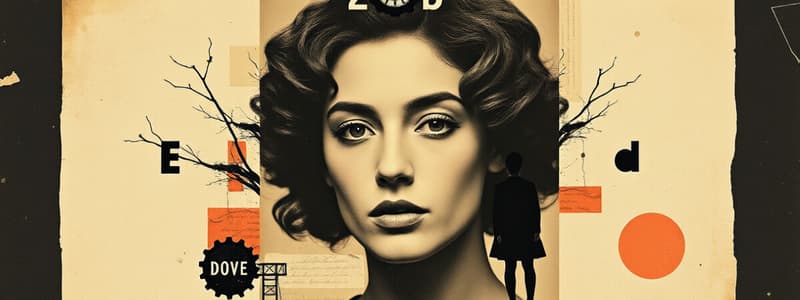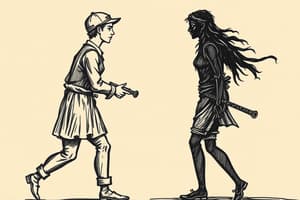Podcast
Questions and Answers
What is the primary characteristic of fiction in literature?
What is the primary characteristic of fiction in literature?
- It is based on factual events.
- It consists of performances intended for an audience.
- It includes poetic forms and rhythmic language.
- It is created from the imagination. (correct)
Which literary device is used to create descriptive language that appeals to the senses?
Which literary device is used to create descriptive language that appeals to the senses?
- Symbolism
- Imagery (correct)
- Metaphor
- Foreshadowing
Which literary movement characterized itself by a focus on emotion and individualism?
Which literary movement characterized itself by a focus on emotion and individualism?
- Realism
- Modernism
- Postmodernism
- Romanticism (correct)
What element of literature refers to the central idea or message conveyed in a narrative?
What element of literature refers to the central idea or message conveyed in a narrative?
Which of the following authors is known for their contributions to the genre of drama?
Which of the following authors is known for their contributions to the genre of drama?
What distinguishes modernism in literature from previous movements?
What distinguishes modernism in literature from previous movements?
Which of the following is NOT considered a type of literary work?
Which of the following is NOT considered a type of literary work?
What is the role of literature in understanding human experience?
What is the role of literature in understanding human experience?
Flashcards are hidden until you start studying
Study Notes
Definition of Literature
- Literature refers to written works, especially those considered to have artistic or intellectual value.
- Categories include novels, short stories, poetry, drama, essays, and more.
Types of Literature
-
Fiction
- Prose works created from the imagination.
- Main genres: novels and short stories.
-
Non-Fiction
- Prose works based on facts and real events.
- Includes biographies, memoirs, essays, and articles.
-
Poetry
- A literary form that uses rhythmic and aesthetic qualities of language.
- Various forms: sonnets, haikus, free verse, etc.
-
Drama
- Works intended for performance; includes plays and screenplays.
- Divided into tragedies, comedies, and tragicomedies.
Elements of Literature
- Theme: Central idea or message.
- Character: Individuals in a story; can be protagonists or antagonists.
- Plot: Sequence of events in a narrative.
- Setting: Time and place where a story occurs.
- Style: Author's unique way of expressing ideas; includes diction, tone, and syntax.
Literary Devices
- Metaphor: A figure of speech comparing two unlike things.
- Simile: A comparison using "like" or "as."
- Imagery: Descriptive language that appeals to sensory experience.
- Foreshadowing: Hints about what will happen later in the story.
- Symbolism: Use of symbols to represent larger concepts.
Literary Movements
- Romanticism: Emphasized emotion and individualism (late 18th to mid-19th century).
- Realism: Focused on representing everyday life and society (19th century).
- Modernism: Featured a break from traditional forms and experimentation (early 20th century).
- Postmodernism: Characterized by irony, playfulness, and questioning of narratives (mid to late 20th century).
Importance of Literature
- Reflects culture and society; offers insight into human experience.
- Encourages empathy by exploring diverse perspectives.
- Serves as a medium for social critique and change.
Notable Authors and Works
- William Shakespeare: Known for plays like "Hamlet" and "Romeo and Juliet."
- Jane Austen: Famous for novels like "Pride and Prejudice" and "Sense and Sensibility."
- Charles Dickens: Notable for "A Tale of Two Cities" and "Great Expectations."
- Toni Morrison: Renowned for works like "Beloved" and "Song of Solomon."
Reading and Analysis
- Engage critically with texts; consider context, author’s intent, and audience.
- Analyze characters, themes, and literary devices to deepen understanding.
- Discuss interpretations and personal responses to enhance engagement.
Definition of Literature
- Encompasses written works valued for artistic or intellectual merit.
- Includes diverse formats such as novels, short stories, poetry, drama, and essays.
Types of Literature
- Fiction: Imaginative prose, prominently features novels and short stories.
- Non-Fiction: Based on factual accounts, includes genres like biographies, memoirs, essays, and articles.
- Poetry: Utilizes language aesthetics and rhythm; variations include sonnets, haikus, and free verse.
- Drama: Scripts intended for performance, categorized into tragedies, comedies, and tragicomedies.
Elements of Literature
- Theme: The primary message or concept behind a work.
- Character: Key figures within narratives, classified as protagonists or antagonists.
- Plot: The arrangement of events that make up the story.
- Setting: The specific time and location within which the story unfolds.
- Style: The author's distinctive approach to conveying ideas, influenced by diction, tone, and syntax.
Literary Devices
- Metaphor: A figurative expression comparing dissimilar objects.
- Simile: A direct comparison utilizing "like" or "as."
- Imagery: Vivid descriptive language that engages the senses.
- Foreshadowing: Early clues that predict future events in the narrative.
- Symbolism: The use of symbols to convey deeper meanings and themes.
Literary Movements
- Romanticism: Celebrated emotion and individualism, prevalent from the late 18th to mid-19th century.
- Realism: Aimed to depict ordinary life and social realities, dominant in the 19th century.
- Modernism: Embraced innovation and deviation from traditional narrative forms in the early 20th century.
- Postmodernism: Known for its ironic tone and playful questioning of established narratives in the mid to late 20th century.
Importance of Literature
- Acts as a mirror reflecting cultural and societal dynamics while deepening understanding of human experiences.
- Fosters empathy by offering varying viewpoints and experiences.
- Functions as a tool for social commentary and advocacy for change.
Notable Authors and Works
- William Shakespeare: Celebrated for iconic plays such as "Hamlet" and "Romeo and Juliet."
- Jane Austen: Renowned for her exploration of social issues in "Pride and Prejudice" and "Sense and Sensibility."
- Charles Dickens: Famous for capturing societal struggles in "A Tale of Two Cities" and "Great Expectations."
- Toni Morrison: Acclaimed for her profound narratives in "Beloved" and "Song of Solomon."
Reading and Analysis
- Approach texts with critical engagement, considering the author's background, intentions, and intended audience.
- Examine characters, themes, and literary devices to enrich comprehension.
- Encourage discussions on interpretations and personal reactions to foster deeper connections with the material.
Studying That Suits You
Use AI to generate personalized quizzes and flashcards to suit your learning preferences.




